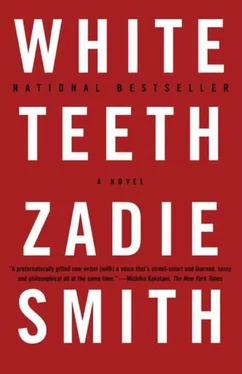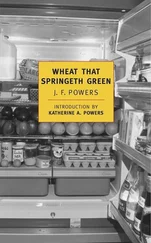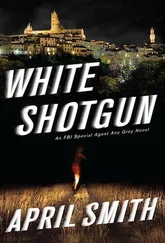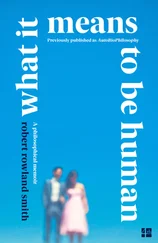After bunking for a few weeks, Irie returned to school. But it seemed so distant; even the journey from South to North each morning felt like an almighty polar trek, and worse, one that stopped short of its goal and ended up instead in the tepid regions, a non-event compared with the boiling maelstrom of the Bowden home. So then because thou art lukewarm, and neither cold nor hot, I will spue thee out of my mouth . You become so used to extremity, suddenly nothing else will do.
She saw Millat regularly, but their conversations were brief. He was green-tied now and otherwise engaged. She still did Marcus’s filing twice a week, but avoided the rest of the family. She saw Josh fleetingly. He seemed to be avoiding the Chalfens as assiduously as she. Her parents she saw on weekends, icy occasions when everybody called everybody by their first names ( Irie, can you pass the salt to Archie? Clara, Archie wants to know where the scissors are ), and all parties felt deserted. She sensed that she was being whispered about in N W 2, the way North Londoners will when they suspect someone of coming down with religion, that nasty disease. So she hurried back to No. 28 Lindaker Road, Lambeth, relieved to be back in the darkness, for it was like hibernating or being cocooned, and she was as curious as everyone else to see what kind of Irie would emerge. It wasn’t any kind of prison. That house was an adventure . In cupboards and neglected drawers and in grimy frames were the secrets that had been hoarded for so long, as if secrets were going out of fashion. She found pictures of her great-grandmother Ambrosia, a bony, beautiful thing, with huge almond eyes, and one of Charlie ‘Whitey’ Durham standing in a pile of rubble with a sepia-print sea behind him. She found a bible with one line torn from it. She found photo-booth snaps of Clara in school uniform, grinning maniacally, the true horror of the teeth revealed. She read alternately from Dental Anatomy by Gerald M. Cathey and The Good News Bible , and raced voraciously through Hortense’s small and eclectic library, blowing the red dust of a Jamaican schoolhouse off the covers and often using a pen knife to cut never-before-read pages. February’s list was as follows:
An Account of a West Indian Sanatorium , by Geo. J. H. Sutton Moxly. London: Sampson, Low, Marston amp; Co., 1886. (There was an inverse correlation between the length of the author’s name and the poor quality of his book.)
Tom Cringle’s Log , by Michael Scott. Edinburgh: 1875.
In Sugar Cane Land , by Eden Phillpotts. London: McClure amp; Co., 1893.
Dominica: Hints and Notes to Intending Settlers , by His Honour H. Hesketh Bell, CMG. London: A. amp; C. Black, 1906.
The more she read, the more that picture of dashing Capt. Durham aroused her natural curiosity: handsome and melancholy, surveying the bricks of half a church, looking worldly-wise despite his youth, looking every inch the Englishman, looking like he could tell someone or another a thing or two about something. Maybe Irie herself. Just in case, she kept him under her pillow. And in the mornings it wasn’t Italianate vineyards out there any more, it was sugar, sugar, sugar, and next door was nothing but tobacco and she presumptuously fancied that the smell of plantain sent her back to somewhere, somewhere quite fictional, for she’d never been there. Somewhere Columbus called St Jago but the arawaks stubbornly re-named Xaymaca, the name lasting longer than they did. Well-wooded and Watered . Not that Irie had heard of those little sweet-tempered pot-bellied victims of their own sweet-tempers. Those were some other Jamaicans, fallen short of the attention-span of history. She laid claim to the past – her version of the past – aggressively, as if retrieving misdirected mail. So this was where she came from. This all belonged to her, her birthright, like a pair of pearl earrings or a post office bond. X marks the spot, and Irie put an X on everything she found, collecting bits and bobs (birth certificates, maps, army reports, news articles) and storing them under the sofa, so that as if by osmosis the richness of them would pass through the fabric while she was sleeping and seep right into her.
As the buds came with the spring, so like any anchoress she was visited. First, by voices. Coming crackling over Hortense’s neolithic radio, Joyce Chalfen on Gardeners’ Question Time :
Foreman : Another question from the audience, I think. Mrs Sally Whitaker from Bournemouth has a question for the panel, I believe. Mrs Whitaker?
Mrs Whitaker : Thank you, Brian. Well, I’m a new gardener and this is my first frost and in two short months my garden’s gone from being a real colour explosion to a very bare thing indeed… Friends have advised flowers with a compact habit but that leaves me with lots of tiny auricula and double daisies, which look silly because the garden’s really quite large. Now, I’d really like to plant something a little more striking, around the height of a delphinium, but then the wind gets it and people look over their fences thinking: Dear oh dear ( sympathetic laughter from the studio audience ). So, my question to the panel is, how do you keep up appearances in the bleak midwinter?
Foreman : Thank you, Mrs Whitaker. Well, it’s a common problem… and it doesn’t necessarily get any easier for the seasoned gardener. Personally, I never get it quite right. Well, let’s hand the question over to the panel, shall we? Joyce Chalfen, any answers or suggestions for the bleak midwinter?
Joyce Chalfen : Well, first I must say your neighbours sound very nosy. I’d tell them to mind their own beeswax if I were you ( laughter from audience ). But to be serious, I think this whole trend for round-the-clock bloom is actually very unhealthy for the garden and the gardener and particularly the soil, I really do… I think the winter should be a time of rest , subdued colours, you know – and then when the late spring does finally arrive the neighbours get a hell of a shock! Boom! There it is, this wonderful explosion of growth. I think the deep winter is really a time for nurturing the soil, turning it over, allowing it a rest and plotting its future all the better to surprise the nosy people next door. I always think of a garden’s soil like a woman’s body – moving in cycles, you know, fertile at some times and not others, and that’s really quite natural. But if you really are determined, then Lenten roses – Helleborus corsicus – do remarkably well in cold, calcareous soil, even if they’re quite in the-
Irie switched Joyce off. It was quite therapeutic switching Joyce off. This was not entirely personal. It just seemed tiring and unnecessary all of a sudden, that struggle to force something out of the recalcitrant English soil. Why bother when there was now this other place? (For Jamaica appeared to Irie as if it were newly made. Like Columbus himself, just by discovering it she had brought it into existence.) This well-wooded and watered place. Where things sprang from the soil riotously and without supervision, and a young white captain could meet a young black girl with no complications, both of them fresh and untainted and without past or dictated future – a place where things simply were . No fictions, no myths, no lies, no tangled webs – this is how Irie imagined her homeland. Because homeland is one of the magical fantasy words like unicorn and soul and infinity that have now passed into the language. And the particular magic of homeland , its particular spell over Irie, was that it sounded like a beginning. The beginningest of beginnings. Like the first morning of Eden and the day after apocalypse. A blank page.
Читать дальше












